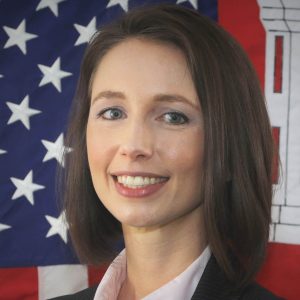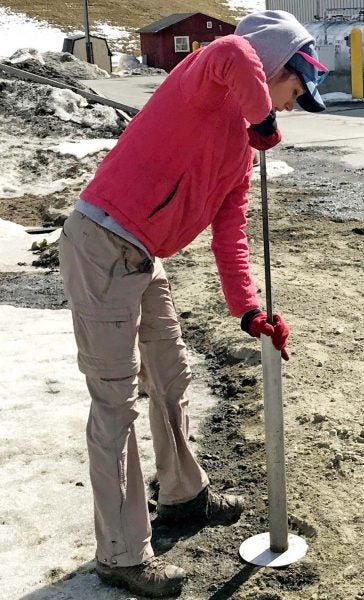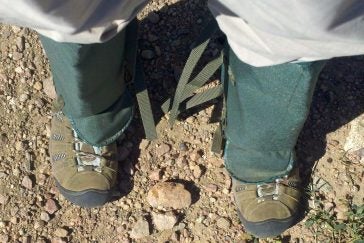
Seeking challenging research opportunities, Meghan Quinn joined the U.S. Army Corps of Engineers as a geotechnical engineer almost a decade ago.
The University of Rhode Island engineering alumna specializes in remote sensing and geographic information systems. Quinn has conducted research at remote locations throughout North America and Europe, but much of her work takes place at the Corps’ Cold Regions Research and Engineering Laboratory in Hanover, N.H.
One of the biggest challenges the North Smithfield, Rhode Island native faces is balancing her career and family life, while pursuing a doctorate in civil engineering at URI, where she previously earned bachelor’s and master’s degrees in the same field.

Q: What type of projects are you working on?
A: I’m currently working on dam and levee safety, fiber optic distributed acoustic sensing (DAS), and instrumentation visualization.
DAS is a fiber optic sensing system that can be used to monitor vibration. At a minimum, it consists of an interrogator and a fiber optic cable. The interrogator pulses light down the length of fiber optic cable, which can be kilometers long, and measures the light scattered back toward the interrogator. Changes in the backscattered light are proportional to the vibration experienced along the cable. My work relates to how installation of the cable and seasonal fluctuations, such as soil moisture and temperature, affect the DAS response. This research will inform how DAS is installed.
When inspecting dams, we photograph and document the conditions of a dam, looking for potential deficiencies, and compare current conditions to past inspections and historical documentation. Safety is taken very seriously when performing remote field work. An up-to-date health and safety plan is a must and appropriate personal protection equipment is required. When inspecting dams in the south or southwest United States, for example, we may need to wear snake gaiters as a first line of defense against rattlesnakes or water moccasins.
For instrumentation visualization, I work with a team of application developers, engineers and technicians to develop an intuitive, modern web application that visually provides instrumentation data in a way that is most useful to the end-user.

Q: What is your proudest achievement at the Army Corps of Engineers?
A: I’m proud to have performed several different roles on projects, including team lead, team member, technical advisor, mentor and manager. I’m also proud to work on projects that have a real impact on civil engineering safety and design, such as dam and levee safety and distributed acoustic sensing.
Q: Which cold environments have you been to for your research?
A: I’ve been fortunate to travel all over the United States, parts of Canada and Europe for various projects. I haven’t traveled to some of the most “extreme” cold locations yet, such as Antarctica, Greenland and Alaska, due to the time commitment involved. Such trips often last for two weeks, one month or longer, and I do not wish to be away from my children for that long. However, the opportunity to travel is one of the wonderful aspects of working at the Cold Regions Research and Engineering Lab.
Q: Why did you decide to work for the Army Corps of Engineers?
A: I transitioned from consulting in the greater Boston area to the Corps’ Engineering Research and Development Center Geotechnical and Structures Laboratory in Vicksburg, Mississippi for a professional adventure and to return to research.
I’m thankful for the time I spent in consulting, where I gained experience in field work, such as drilling, sample collecting, coring and compaction control. It also enabled me to improve my finite element modeling skills and technical writing.
Q: How have you applied what you learned at URI in your career?
A: After receiving my master’s degree at URI, I began my career at a geotechnical consulting firm, where I immediately applied engineering knowledge gained through URI graduate and undergraduate classes.
For more than a decade, I’ve worked on dam and levee safety projects. My geotechnical undergraduate and graduate coursework at URI prepared me to perform the inspections, subsurface exploration, soil sample testing, finite element modeling and reporting involved in these projects.
Q: How do you balance motherhood, working full-time and pursuing a Ph.D.?
A: As most full-time working parents will tell you, balance is hard and often impossible. Organization and planning are essential when it comes to work-related project deliverables, academic deliverables and family time. I try to be fully present when I am working and fully present when I am “momming.” The pandemic blurred the lines between work and home. For example, trying to lead a web meeting with my children in the background can be challenging. I could not work, pursue a doctorate and be the best mom I can be without the love and support of my husband.
Q: What advice do you have for engineering students?
A: Maintain the friendships and connections you make in college and throughout your career. You never know where your peers will end up in a decade or two. Also, take licensing exams as soon as you can and never stop learning.
